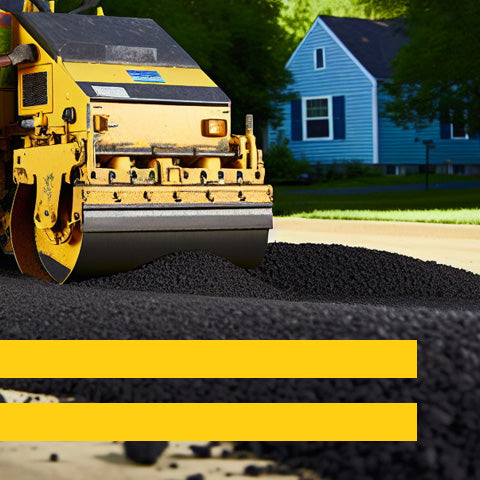Maximizing Curb Appeal: A Smart Guide to Asphalt Millings Driveway Installation and Benefits
Why choose an asphalt millings driveway? Cost efficiency, durability, and sustainability are its hallmarks. This guide offers a no-nonsense breakdown of installing and maintaining an asphalt millings driveway, featuring benefits that align with your home improvement goals. Read on to see if this environmentally conscious choice meets your driveway needs.
TLDR: Key Takeaways
- Asphalt millings are a sustainable paving material created from recycled asphalt pavement, providing a cost-effective and eco-friendly alternative for driveways with longevity between 20 to 30 years.
- Preparation for an asphalt millings driveway involves site clearance, appropriate excavation, soil compaction, and selection of the right equipment to ensure a stable and long-lasting surface.
- Regular maintenance, including inspections, repairs, sealcoating, proper drainage, and re-compaction, is essential to prolong the life of an asphalt millings driveway, and choosing a qualified contractor is critical for quality installation.
Understanding Asphalt Millings
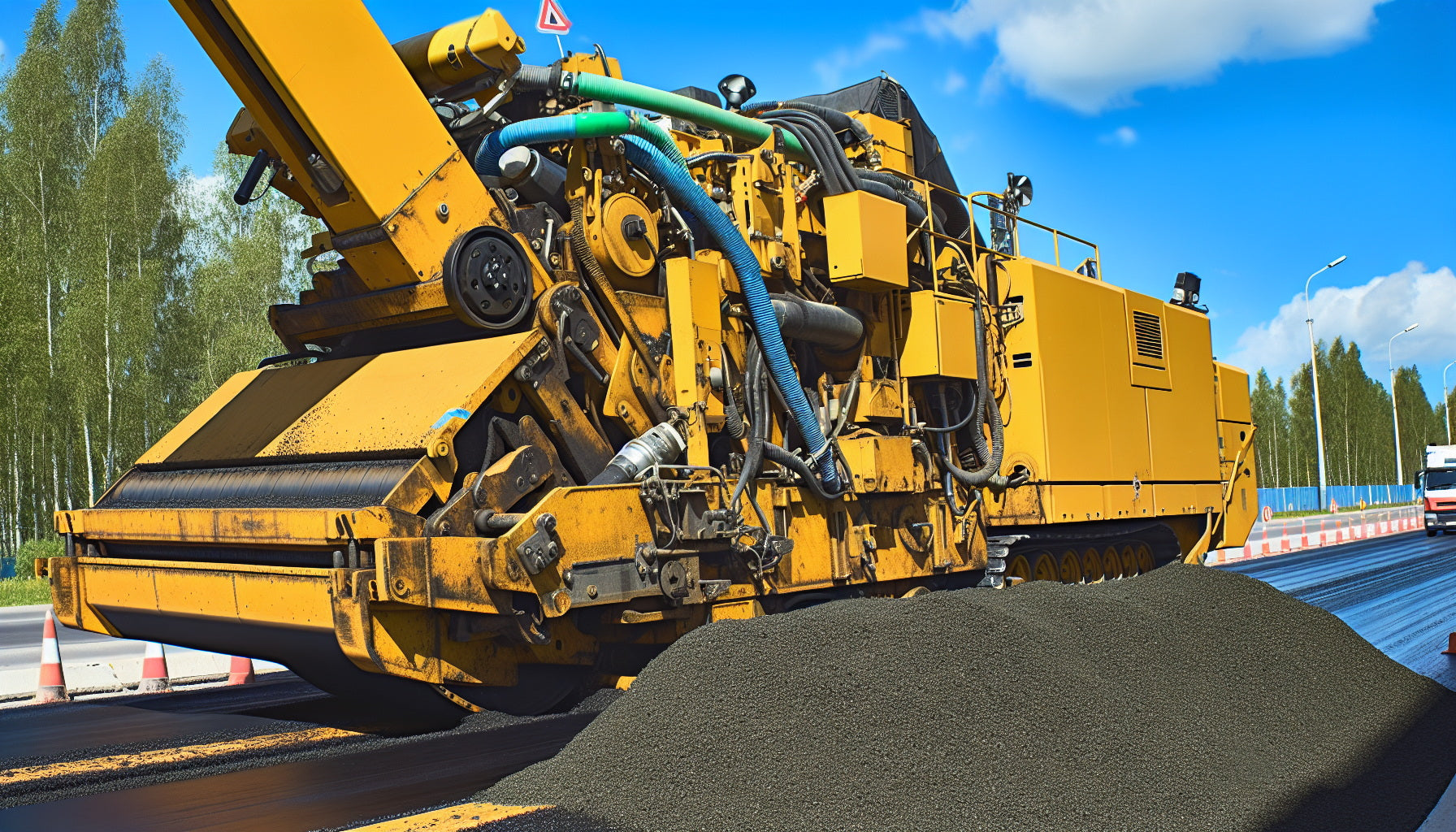
The process of asphalt milling consists of:
- Taking off the top layer from a pre-existing asphalt pavement,
- Producing tiny fragments, referred to as asphalt millings, which are essentially recycled asphalt,
- Revealing new opportunities for utilization.
This is accomplished through the use of specialized equipment designed specifically to meticulously grind down aged or damaged pavement surfaces and remove the deteriorated top layer as part of the overall milling process.
Far from being discarded material, these recovered fragments play an integral role in improving pavement repairs and serve as a fundamental element in many eco-friendly paving endeavors.
Reclaimed Asphalt Pavement (RAP)
Recycled Asphalt Pavement (RAP) is obtained by the extraction of existing pavement layers, including the very top layer of asphalt. This retrieval may occur through extensive milling or even full depth removal methods. Once this old pavement is gathered and processed—crushed, screened—it turns into superior grade aggregates blanketed with asphalt cement. Incorporating recycled asphalt in the renewal process significantly improves both environmental friendliness and economic efficiency for paved surfaces.
In some cases, RAP can be reintegrated directly on-site. It’s ground up and amalgamated with stabilizing compounds to function as a foundational base course beneath new layers of asphalt surface. The caliber of such recycled material fluctuates greatly based on the initial condition of the reclaimed asphalt along with any prior processes it might have been subjected to.
Characteristics of Asphalt Millings
The quality of asphalt millings can significantly affect the end result of a paving project. These millings’ textures range from coarse to fine, depending on the milling equipment and method used during their production. The size of these granules is usually regulated for uniformity, which helps create an interlocking foundation that’s ideal for driveways and other types of paved areas.
During the process where old asphalt surfaces are broken down by milling machines with spinning drums fitted with carbide teeth, not only is crushed asphalt generated but hot asphalt as well. This aspect leads to different finishes in the milled surface — from standard to micro-milling levels — each tailored for varying needs within a particular paving assignment. Such operations carried out by milling machinery ensure that milled surfaces conform closely to pre-defined standards.
To learn more, check out this article about asphalt millings vs. gravel.
The Benefits of Using Asphalt Millings for Driveways
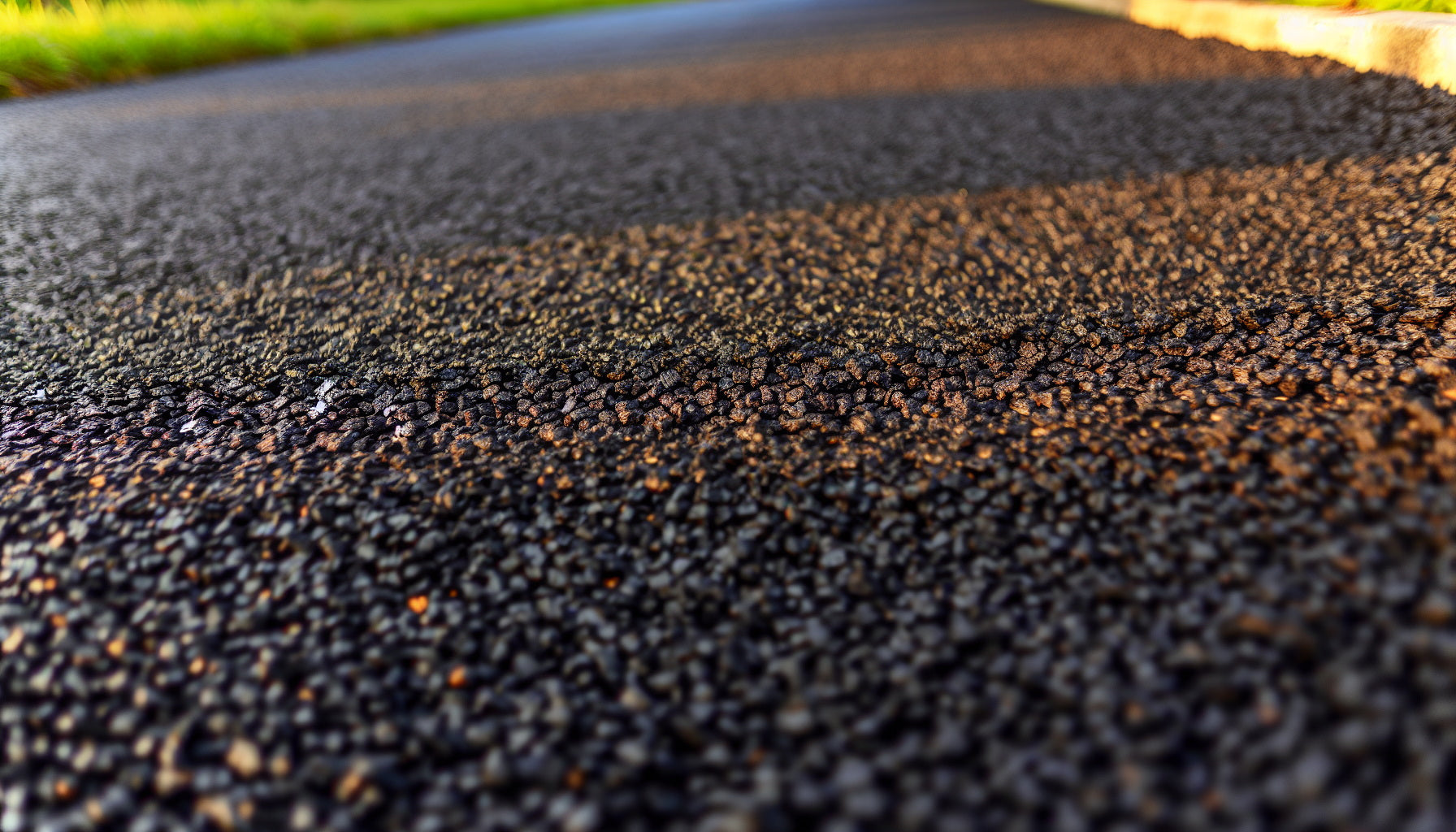
Opting for asphalt millings as a choice of paving material for your driveway isn’t only wise—it’s advantageous on several fronts. These millings present a budget-friendly alternative to purchasing brand-new materials while providing a durability that competes with conventional paving options.
The environmental benefits are noteworthy. Utilizing recycled old pavement to create fresh, practical driveways allows asphalt millings to play an instrumental role in decreasing waste and cutting down carbon emissions, thus garnering preference among environmentally minded property owners.
Cost-Effective Solution
Asphalt millings offer a financially accessible option for your paving requirements, notably in the case of asphalt driveways. The expenses associated with this type of asphalt material are significantly less than those involved in purchasing and laying new asphalt, including reduced costs related to both installation and transportation.
Choosing to use asphalt millings not only reduces initial expenditures, but also minimizes future upkeep costs. This approach provides an economically advantageous solution for fulfilling your needs concerning asphalt paving and maintenance.
Long-lasting and Durable
Asphalt millings have gained a reputation for their robustness, enduring anywhere from two to three decades with only basic upkeep required. As the millings age, they undergo a natural hardening process that enhances the surface strength, enabling it to withstand harsh weather and bear heavy traffic loads without necessitating frequent resurfacing.
The lifespan of an asphalt milling driveway is influenced by several variables including the quality of installation, level and intensity of traffic over it, as well as environmental conditions. With appropriate maintenance measures in place, its durability remains unparalleled.
Environmentally Friendly Choice
Recycling old asphalt into new asphalt millings is both an environmentally friendly and cost-effective solution. The benefits of this recycling process include:
- Lower energy consumption and reduced greenhouse gas emissions compared to producing fresh asphalt from raw materials
- Preservation of resources through the reuse of existing materials
- Alleviation on the demand for natural resource extraction
- Decrease in waste directed towards landfills
Choosing to use asphalt millings for your driveway not only enhances its appearance, but also contributes positively to environmental sustainability.
Preparing for an Asphalt Millings Driveway Installation
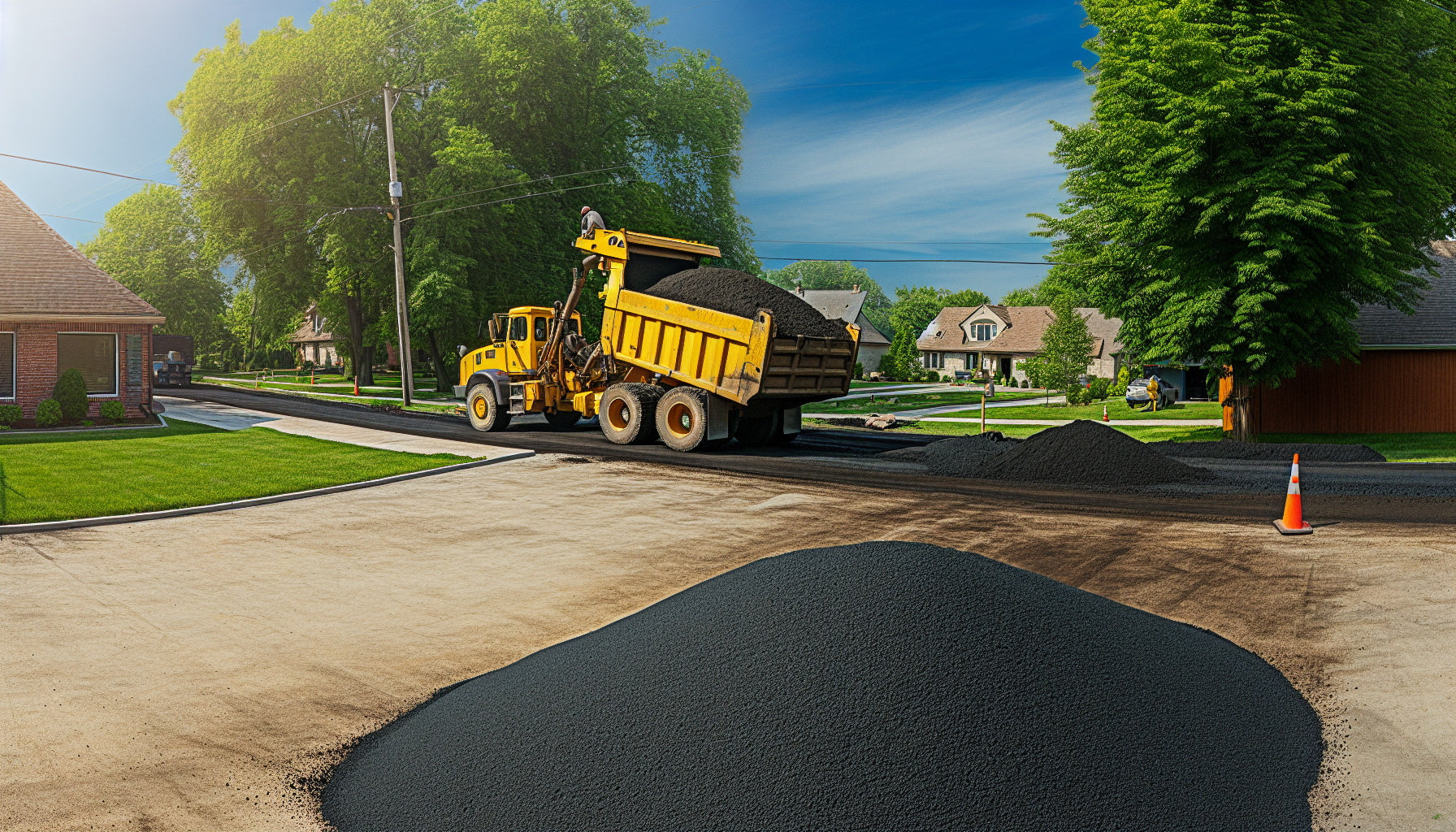 For a successful installation, it is critical to rigorously prepare the site before introducing any millings. This preparation entails:
For a successful installation, it is critical to rigorously prepare the site before introducing any millings. This preparation entails:
-
Removing all remnants of former pavement as well as clearing away debris and vegetation, ensuring a pristine base for your new driveway.
-
Digging down to the necessary depth for laying down the material.
-
Densely packing the underlying soil to provide a firm bedrock that will bolster the millings and enhance durability of your driveway’s surface.
Site Preparation
Preparing the site is not merely an initial step. It is a vital stage that forms the foundation for your whole driveway endeavor. To create a solid base capable of maintaining both the integrity and aesthetic of your asphalt millings driveway, it’s imperative to grade and level the ground, secure proper drainage, and thoroughly compact the earth.
Selecting the Right Equipment
Ensuring a smooth and uniform application of asphalt millings requires choosing the appropriate machinery. It is imperative to employ specialized equipment such as a skid steer loader, compactor, and grader to attain optimal outcomes in paving with asphalt.
Installing Your Asphalt Millings Driveway
The commencement of your driveway’s installation phase signifies the initial formation of its structure using asphalt millings. To ensure a robust, enduring surface that can withstand prolonged use, it is critical to distribute the millings uniformly and achieve solid compaction.
Spreading the Millings
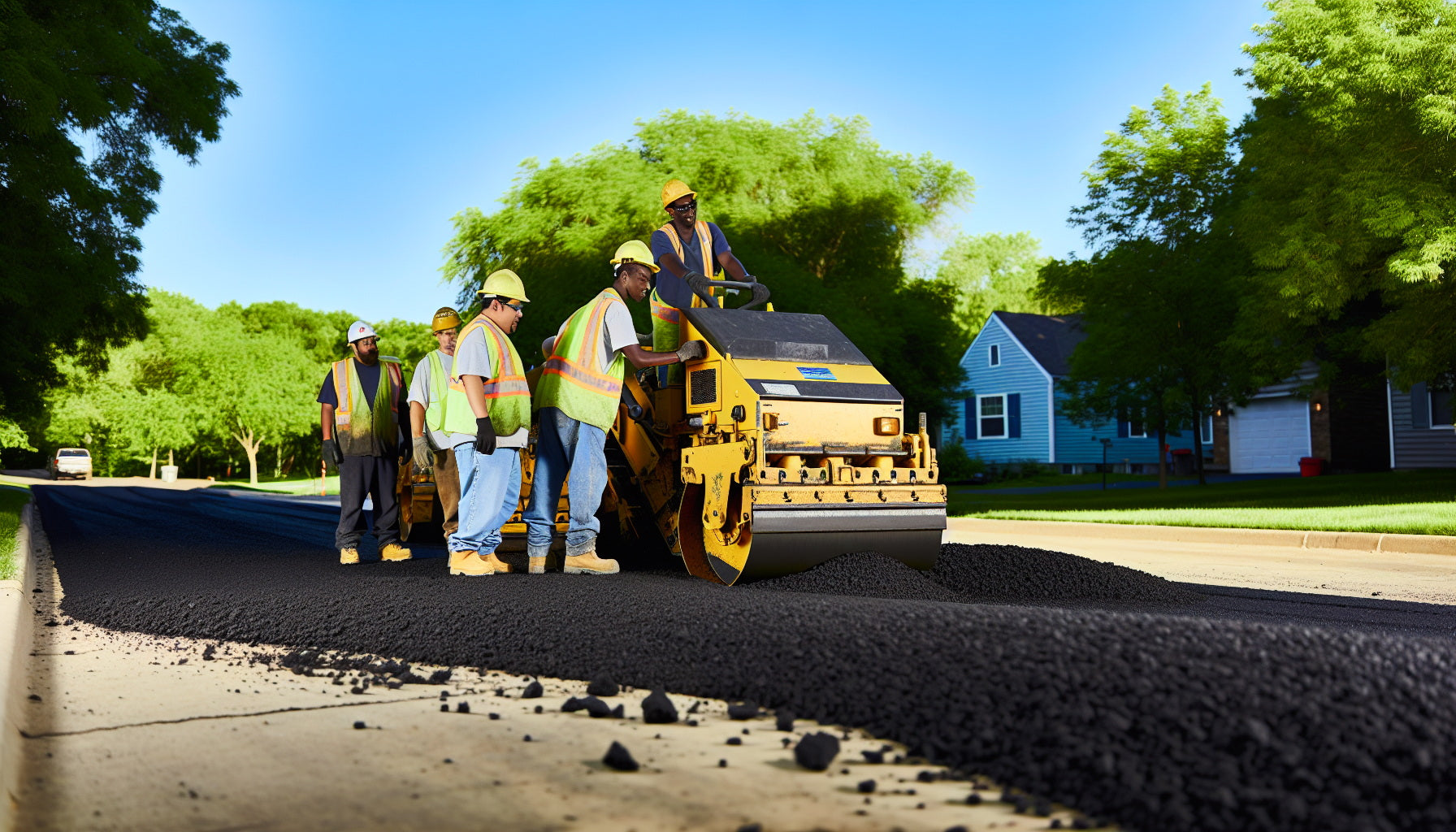 Carefully distribute the asphalt millings to avoid creating any areas that may weaken your driveway’s structure. Utilize a skid steer loader for uniform spreading and rely on hand shoveling to refine the perimeter for precise edge work.
Carefully distribute the asphalt millings to avoid creating any areas that may weaken your driveway’s structure. Utilize a skid steer loader for uniform spreading and rely on hand shoveling to refine the perimeter for precise edge work.
Compacting for a Sturdy Surface
To guarantee a robust driveway without any air voids, it is crucial to compact the surface thoroughly. This might require several repetitions with a compaction roller, particularly if your driveway is subjected to heavy traffic.
Maintenance Tips for Asphalt Millings Driveways
By conducting consistent maintenance and inspections of your driveway made from asphalt millings, including safeguarding proper drainage and routinely re-compacting the surface, you can maintain its quality and aesthetic appeal for many years to come.
Regular Inspections and Repairs
Consistent monitoring acts as the primary form of protection for preserving your driveway made of asphalt millings. By dealing with minor fissures and signs of deterioration promptly through immediate restorations, you can avert more significant problems and prolong the lifespan of your driveway.
Proper Drainage and Erosion Control
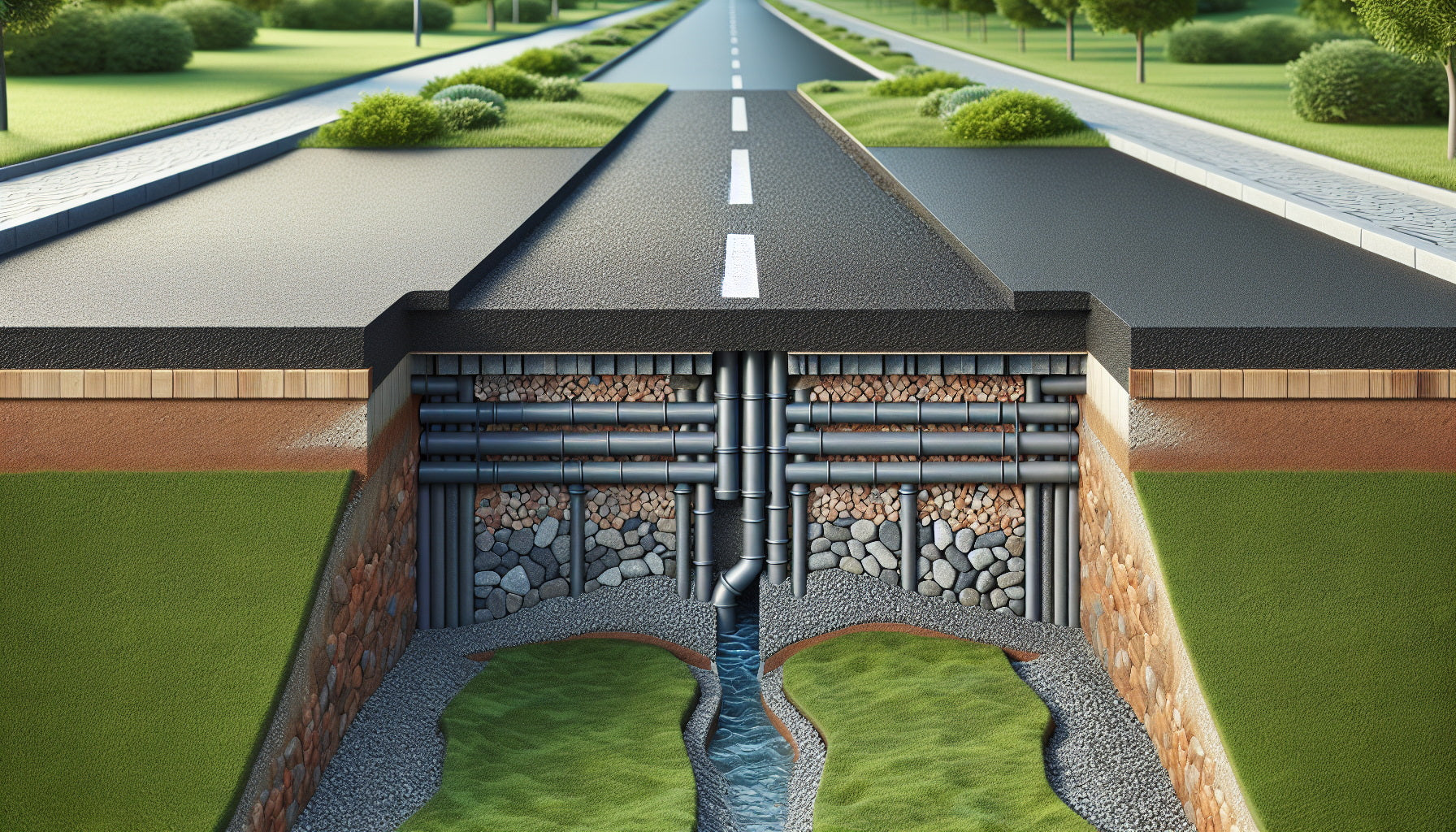 Ensuring appropriate water drainage is essential for maintaining the durability of your driveway made from asphalt millings. Creating a slight slope to divert water away will help protect against moisture damage and uphold the stability of your asphalt surface.
Ensuring appropriate water drainage is essential for maintaining the durability of your driveway made from asphalt millings. Creating a slight slope to divert water away will help protect against moisture damage and uphold the stability of your asphalt surface.
Creative Uses of Asphalt Millings Beyond Driveways
Asphalt millings have a range of applications that go beyond just creating driveways. They’re useful in numerous construction and landscaping endeavors. Some ways in which these millings can be employed include:
- Creating foundational layers for new roadways
- Controlling erosion within landscaped areas
- Building out parking lots
- Laying down pathways
- Patching up potholes
- Resurfacing roads
Offering an eco-friendly option, asphalt millings improve the stability of dirt roads while simultaneously bringing down the expenses associated with their upkeep.
Expert Advice: Choosing the Right Contractor for Your Asphalt Millings Driveway
It is essential to select a contractor with the right qualifications, including experience and licensure, along with proper insurance coverage for your driveway project involving asphalt millings. Assessing customer reviews is also important to confirm that you are hiring a professional capable of providing high-quality work that aligns with both your financial plan and schedule.
Summary
To sum up, choosing asphalt millings for your driveway provides a visually appealing, long-lasting, and environmentally responsible solution. Comprehending the substance’s characteristics, advantages, and the necessary steps to lay it down will help you make a knowledgeable choice that promises enduring satisfaction. Allow the charm of expertly laid asphalt millings to be the motivation for your upcoming home enhancement endeavor.
Frequently Asked Questions
Is asphalt millings good for a driveway?
Certainly, utilizing asphalt millings is an effective method for prolonging the lifespan of your driveway through crack repair and can serve as a foundational layer for establishing a fresh asphalt driveway or parking area.
For various undertakings where gravel might typically be employed, opting for millings presents a financially prudent option.
Are asphalt millings better than gravel?
Indeed, asphalt millings surpass gravel due to their enhanced durability against ice accumulation, improved performance in melting snow, increased resistance to wear and tear, as well as a reduced tendency for dust and debris collection resulting from vehicular traffic.
What are the disadvantages of asphalt millings?
Before opting to use asphalt millings for your project, it’s crucial to take into account several drawbacks. These include inconsistent quality and composition, the possibility of contaminants being present, an absence of evenness and consistency in texture, as well as challenges concerning their availability and procurement.
Understanding these limitations is essential when determining whether asphalt millings are suitable for your specific needs.
Can asphalt millings be used for more than just driveways?
Certainly, asphalt millings are a versatile material that can be employed in numerous applications including the creation of new road base layers and as an erosion control measure within landscaping endeavors, thus making them valuable for both construction and landscaping projects.
What is the life expectancy of an asphalt millings driveway?
When correctly installed and maintained, a driveway composed of asphalt millings can endure 20 to 30 years, providing your property with a durable surfacing option.

